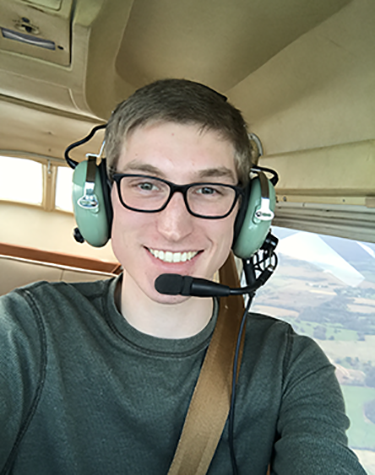I’d like to start my career with flying. I love it. Eventually I want to get a computer science job in the aviation industry. It would be a great way to combine the two skill sets.
Alex Seals

Alex Seals completed two flight training courses that are part of Mason Engineering’s aviation flight training and management minor.
Learning to fly in Mason’s flight training program changed one engineering student’s career path.
“Ever since I was a kid, I wanted to fly. I wanted to be a pilot, and now I am,” says Alex Seals, a senior studying computer science.
He recently passed the Federal Aviation Administration’s checkride, a practical exam to become a pilot, after completing two flight training courses that are part of Mason Engineering’s aviation flight training and management minor.
Seals enjoys flying so much that he wants to continue his training to become a commercial pilot, which would allow him to be paid for his pilot services. Then he wants to become an airline transport pilot so he can fly for the airlines.
“I’d like to start my career with flying. I love it,” he says. “Eventually I want to get a computer science job in the aviation industry. It would be a great way to combine the two skill sets.”
For the past few years, Seals has successfully combined working and going to school. He started as a part-time employee in tech support at Mason’s ITS Support Center when he was a junior in high school and continued through his freshman year in college. In 2013, he became a full-time employee and part-time student. He’s currently working for Mason’s Desktop Support department while taking two to three classes a semester.
Mason’s flight training program was a perfect fit for him because he earned college credit and his tuition was covered as part of his benefits as a Mason employee. He had to pay a couple thousand dollars to cover the flight training expenses that the tuition reimbursement benefit didn’t cover.
The program was well organized and hands-on, he says. On his first day of flight training school at the Manassas Regional Airport, he got into the cockpit of a Cessna 172, and his flight instructor at Aviation Adventures said, “You’ll do the takeoff.”
Seals was excited and nervous, but he did it successfully. At the end of the flight, his instructor said, “You did the takeoff, so you can do the landing.”
“I had done some reading beforehand, so I wasn’t totally in the dark about what to do,” he says. Plus, the instructor had access to all of the controls and could grab them if he needed to.
Some skills took longer for him to learn than others. “I persisted through all of it. It was challenging, but in a good way. I like a challenge.”
Lance Sherry, director of the Center for Air Transportation Systems Research, says the aviation flight training and management minor gives students a big competitive advantage when competing for employment with airlines, airports, and air traffic control.
Those completing this minor are a step closer to jobs as commercial pilots, military pilots, corporate pilots, certified flight instructors, unmanned aerial systems operators, airline dispatchers, airport managers, air traffic controllers, aviation flight test engineers, and aviation system engineers.
Besides opening new career options for him, flying has become a new passion, Seals says. “The view is a huge part of it for me. Being able to see the landscape from above is amazing. I like flying at night too because I like lights, and this area lights up really well.”
The other part is the freedom. “Around here, the traffic is wild. With flying, you can get places pretty efficiently.”
